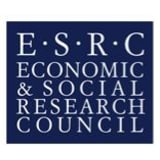
Economic and Social Research Council (ESRC) - United Kingdom
About
They are the UK's largest organisation for funding research on economic and social issues. They support independent, high quality research which has an impact on business, the public sector and civil society. Their total budget for 2017-18 is around £202 million. At any one time they support over 4,000 researchers and postgraduate students in academic institutions and independent research institutes.
They are a non-departmental public body (NDPB) established by Royal Charter in 1965 and receive most of their funding through the Department for Business, Energy and Industrial Strategy (BEIS). Their research is rigorous and authoritative, as they support independent, high-quality, relevant social science.
What they offer
They offer:
- Quality: All ESRC research awards are made in open competition, subject to transparent peer assessment at the outset and evaluation on completion. Rigorous standards are applied to all the training they support. Their research often involves multidisciplinary teams, collaboration with other councils, and frequently takes a long-term view. Their datasets, longitudinal and panel studies are internationally acclaimed resources.
- Impact: Their research makes a difference: it shapes public policies and makes businesses, voluntary bodies and other organisations more effective as well as shaping wider society. Their knowledge exchange schemes are carefully devised to maximise the economic and social impacts of the research that they fund.
- Independence: Although publicly funded, their Royal Charter emphasises the importance of independence and impartial research. They have no 'in-house' researchers, but distribute funds to academics in universities and other institutes throughout the UK.
Mission
Their role is to:
- promote and support, by any means, high-quality research and related postgraduate training on social and economic issues
- develop and support the national data infrastructure that underpins high-quality research
- advance knowledge and provide trained social scientists who meet the needs of users and beneficiaries, thereby contributing to the economic competitiveness of the UK, the effectiveness of public services and policy, and the quality of life
- communicate clearly and promote public understanding of social science.
Research
They are committed to supporting the very best research, with scientific excellence the primary criterion for funding. All their funding opportunities are highly competitive and only those proposals judged by experts in the field to be of the highest scientific quality are supported.
- Research
Training
They play a key role in promoting and supporting training for the UK social science community throughout their careers. They invest in high-quality research training and development opportunities to produce skilled researchers who are able to tackle the most pressing social and economic challenges and have a broader impact on society.
- Skills and careers
Partnerships
Partnerships bring a wealth of opportunities to the social sciences, from the development of researchers skilled in knowledge exchange to creating maximum impact of their research on society’s most complex challenges. Building strategic partnerships with academia, the public and private sectors, and civil society is a key aspect of their work.
- Collaboration
Infrastructure
Researchers require access to world-class data and pioneering research methods to deliver high quality research and maximise impact. They take a strategic lead in driving the expansion of the UK's data infrastructure and supporting cutting-edge methodological developments.
Working internationally
They are an international leader in the social sciences. They foster international collaboration with a wide range of international partners and, through joint schemes, they enable UK social scientists to collaborate on challenging global issues with the very best international researchers from around the world.
- International research
Public engagement
They work to raise public awareness of social science and they encourage involvement in research that will translate into benefits for society and individuals.
- Public engagement
History
They began in 1965 as the Social Science Research Council and in 1983 they became the Economic and Social Research Council.
Type of organization



Company Offices
- United Kingdom (headquarters)
- Swindon
- Polaris House North Star Avenue